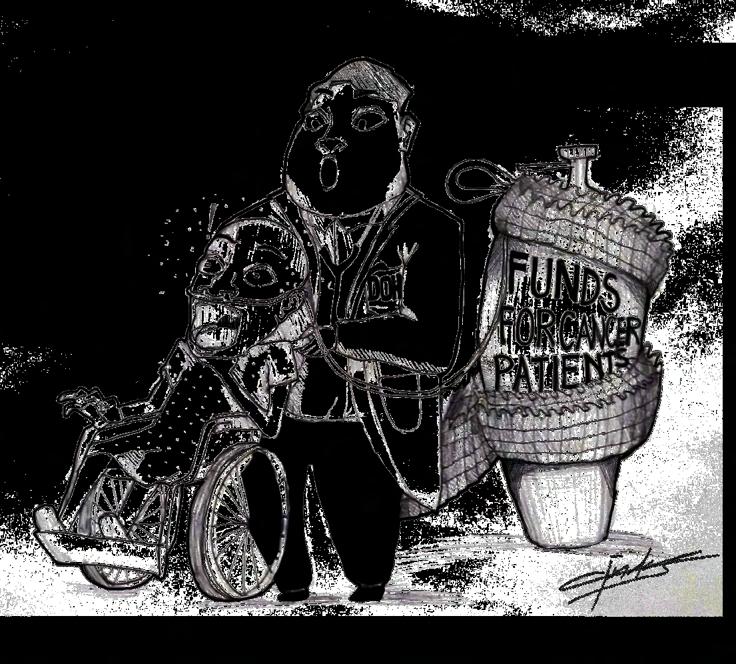
8 minute read
PEN. PAIN. POWER. Bloody Taint that Paints Truth
and one cannot just turn a blind eye.
While anyone can be a journalist as anyone possesses the potential to document and investigate, anyone can be a target as well.
Advertisement
However, despite these challenges, it should not hinder us to still look forward and vision a country that is free oneself, imagine those peek holes of the darkest room that would light up as light transcends through them. The power that keeps the light from shining is on us. Never fail to protect it. Never fail to look even at the smallest light that comes from within. It is a hope.
Likea phoenix rising from its pyre, the triumphant revival of collegiate journalism in Oriental Mindoro should stand as an inspiration in leading other small provinces towards reclaiming their own journalistic prowess.
In Oriental Mindoro, a transformative shift has taken place in the realm of collegiate journalism. Led by student-led publications like Divine Word College of Calapan’s The DWCC Gazette, a rebirth of student reporting has emerged, amplifying the voices of students across various local higher education institutions (HEIs). With its consistent social media reportage and recent recognition at the 44th Catholic Mass Media Awards, The DWCC Gazette has ignited a wave of active reporting in other HEIs, fostering a pro-student environment. This resurgence of collegiate journalism not only celebrates student successes but also encourages students to express their opinions on institutional matters.


The DWCC Gazette’s exemplary social media reportage has become a beacon for other student publications in Oriental Mindoro. Inspired by their success, these publications have become more proactive in capturing and showcasing the achievements and triumphs of their institutions and students. By highlighting these accomplishments, student-led publications have instilled a sense of pride, motivation, and inspiration among their peers.
One of the unintentional challenges faced by studentled publications is the potential for plagiarism of publication material designs. As these publications seek inspiration from established sources, there is a risk of inadvertently replicating design elements without proper credit. It is vital for collegiate journalists to uphold ethical standards, respecting the intellectual property of others while striving for originality.
Additionally, student journalists often find themselves in a vulnerable position, facing criticism and attacks for the articles they publish online. However, it is through these experiences that they gain a glimpse and taste of the realworld challenges faced by professional journalists. They learn to navigate and respond to feedback, develop resilience, and strengthen their journalistic skills, preparing them for future careers in the industry.
Collegiate journalism is not only advantageous for the institutions themselves but also for the student journalists involved. By promoting a pro-student environment, HEIs foster a sense of belonging, encouraging students to actively participate in campus life. Through responsible reporting, student journalists gain valuable skills in research, writing, critical thinking, and ethical journalism practices. They become the voice of their peers, representing their concerns and aspirations.
Furthermore, collegiate journalism offers student journalists the opportunity to engage with the broader community and build connections beyond their institutions. They develop professional networks, learn to adapt to different audiences, and understand the significance of their role in shaping public opinion. These experiences not only contribute to their personal growth but also equip them with the necessary tools and insights to thrive in the dynamic world of journalism.
The resurgence of collegiate journalism in Oriental Mindoro, influenced by student-led powerful transformation in HEIs. Through consistent social media reportage and recognition at prestigious awards, student publications have inspired their peers to embrace proactive reporting and feature their institution’s achievements. This renewed focus on student successes has fostered a more prostudent environment within HEIs, enabling students to express their opinions on institutional matters. While challenges like unintentional plagiarism and criticism exist, the benefits of collegiate journalism outweigh these drawbacks. It empowers students, strengthens institutions, and prepares student journalists for the realworld challenges of journalism. As Oriental Mindoro continues to embrace the power of collegiate journalism, it sets a remarkable example for other provinces, demonstrating the potential of student voices in shaping a better future for education and society at large.
LANCE SARMIENTO


Keeping Up With the DOH: Php 786 Million On Hold for Cancer Patients?
“
The lack of proper oversight and accountability has left many Filipino families with cancer victims, especially the patients themselves, the right to live their best life possible with the people they love.
Canceris one of the most horrible diseases that could happen to somebody’s health. But mishandling a.k.a corrupting the funds allocated for cancer patients by a governmental organization? That is a higher level kind of sickness.

According to studies, cancer has emerged as one of the nation’s top mortality, raising serious concerns about the country’s health. Data from the Philippine Cancer Society shows that more than 10% of all fatalities in 2019 and more than 50% of fatalities among those over the age of 45 were brought on by cancer. Additionally, there are about 130 new cases reported every day, and the yearly cost of diagnosis and treatment is roughly PHP 7 billion (USD 140
“Good morning! It’s another great day ahead! How is your sleep? Have you done your assignments or plates to be passed today? Oh no. Hurry.”
We only have 24 hours per day. Not necessary all as we target that good rest, one must have at least 8 hours of sleep. The remaining time million).
The most common types of cancer affecting Filipino patients include breast cancer (23%), lung cancer (14%), colorectal cancers (10%) , prostate cancers(7%) , stomach cancers(6%) as well as liver and cervical cancers which account for 5% each. Unfortunately these figures may be even higher due to underreporting or misdiagnosis since many Filipinos lack access to proper healthcare facilities or cannot afford costly treatments such as chemotherapy or radiation therapy. The number of people who suffer from cancer alone, not being given enough access to healthcare in the Philippines is already enough to disturb one’s comfortable seat in the government.
To address this issue, various initiatives have been implemented by the government with the lead of the Department of Health (DOH). Patients with cancer have received financial aid from the DOH for a long time. Several programs, such as grants and subsidies, are used to give this assistance. These grants are offered to cancer patients and their families in an effort to assist them in nowadays, it is an achievement if you spend 2 or more hours, excluding class time, studying independently on school work or working on a better version of yourself through learning/ honing your skills. Or the other way around with you having only a limited time to finish a pile of activities. Consequently, it is common for us to, you covering their medical costs while undergoing treatment. Treatments like chemotherapy and radiation therapy are being offered and funded by the DOH. The amount granted is assessed by the recipient’s income level, as well as their condition and lifestyle choices that may have an impact on their capacity to pay for medical treatment. Additionally, there are also special funds designated for those who are unable to pay for any form of treatment because of their extreme poverty or their disability, which prevents them from working full-time jobs. These funds can provide access to additional resources or health insurance coverage during this time. That is the plan, until it was not.
Recently, accusations have been directed at the Philippine Department of Health for the mismanagement of the allocated funds for cancer patients. A graft and malversation charges was filed by Dr. Clarito U. Cairo Jr., a DOH medical officer and medical specialist against DOH for the alleged mismanagement of a whopping PHP 786 million allocated in 2022 for cancer patients under the Cancer SupportivePalliative Medicines Access Program (CSPMAP).
Cairo alleged that the respondents, Undersecretary Beverly Lorraine Ho, Director IV Razel Nikka M. Hao, Director IV Anthony B. Cu, Dr. Kim Patrick S. Tejano; Dr. Jan Auro Laurelle V. Llevado; and former Director IV Anna Melissa S. Guerrero, are “liable for Grave Misconduct, penalized under 2017 Rules on Administrative Cases in the Civil Service (2017 RACCS), Malversation of Public Funds defined and penalized under Article 217 of the Revised Penal Code, and violation of Section 3(e) of
Republic Act 3019 otherwise known as the Anti-Graft and Corrupt Practices Act.”
The Filipino people quickly expressed their disappointment for the government organization. DOH were set under fire, receiving numerous backlash that mishandling funds has only exacerbated this problem, leaving many without access to life-saving treatments or medications they need.
The lack of proper oversight and accountability has left many Filipino families with cancer victims, especially the patients themselves, the right to live their best life possible with the people they love. The Department of Health being accused of mismanagement of funds, true or not, should not deceive the Filipino people the right to access proper healthcare, it should not be asked nor begged for, it is basic human rights.
It is crucial that the proper any anomalies may be swiftly found and fixed before they turn into bigger concerns in the future. stopping. Some students don’t bother. Some students knew but hastily get out of the campus like it was a race before 6 AM, noon, and 6 PM. It is the Angelus. The Angelus is a special prayer recited by Catholics three times a day and is accompanied by the ringing of the Angelus bell. Each recitation includes three Hail Marys with antiphons and responses in between each. It is not typically a long prayer taking around 3-5 minutes but why are there fewer and fewer students participating in the Angelus yet you can spend two or three 20-minute MOBA matches, half or more of an hour updating your circle about your recent gimmicks and others? There are so many questions about how we really
Ultimately, if we want our health system to provide adequate care for those with cancer, then we need to ensure that our government representatives are held accountable when it comes to managing these important funds properly so they would reach their intended recipients efficiently without difficulty. We must also continue advocating until every Filipino citizen affected by this terrible disease receives quality healthcare at an affordable cost regardless of their social status, economic background, and age. Allowing people more opportunities towards bettering themselves medically without having any additional worries concerning money is an invaluable gift that would surely bring comfort during difficult times like these.
JONH MARC D. MARTINEZ
ONE PERCENT practice evangelization as one of the school’s core values.
The Divine Word College of Calapan is a catholic institution serving quality education to diverse learners. Following inclusivity, the school accepts students even those who are not catholic so long as they wish to study here. It may be an excuse why I shouldn’t participate in the Angelus, right? But the answer is ‘respect’. In the bigger life, we will find ourselves in some different world with their own set of cultures and practices. It is imperative that we should simply pay respect to it. Similarly, why can’t we pause for a while and devote a few minutes as the angel of the Lord declares unto Mary? Even if you are in a hurry, having valid reasons as to what, why, and how, etc, please pay respect.
“Angelus Domini nuntiavit Mariæ”
It is not much of an issue but a drop of water on a stone leaves a mark over time. If one cannot devote at least 5 minutes, what more is a complete holy mass for him/ her? After all, now that you have read this, I hope that you had a moment of reflection and realized that the Angelus piously uses at least 5 minutes of your time every 6 AM, noon, and 6 PM in the 24 hours that a day has. You do the math.











